|
|
Recipient Agency and Public Facing Training
Course Name
|
Course Materials |
Course Description |

Stronger Together:
Empowering Your Food Pantry Through Food Bank Partnerships |
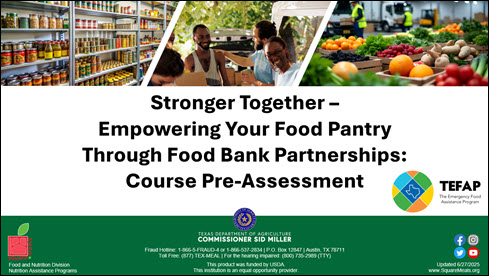 |
Course Pre-Assessment: Stronger Together - Empowering Your Food Pantry Through Food Bank Partnerships
Before starting the training, please take a few minutes to complete this short assessment. Your responses will help measure the training’s effectiveness.
Intended Audience: Staff and volunteers at emergency feeding organizations, including food banks, soup kitchens, and housing authorities.
Duration: 7 minutes 30 seconds |
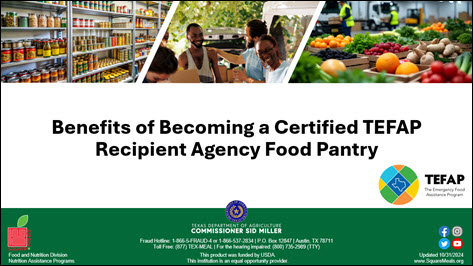 |
Benefits of Becoming a Certified TEFAP Recipient Agency Food Pantry
Discover how becoming a certified TEFAP recipient agency can help your food pantry provide better services, access to valuable resources, build stronger connections with food banks, and support your work in serving the community.
Intended Audience: staff and volunteers who work at emergency feeding organizations such as food banks, soup kitchens, and housing authorities.
Duration: Approximately 5 minutes |
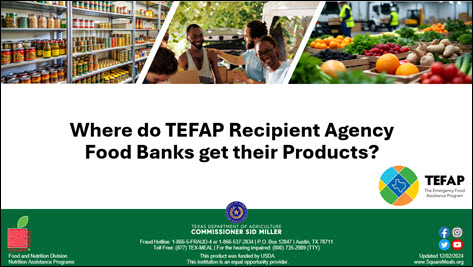 |
Where Do TEFAP Recipient Agency Food Banks Get Their Products?
This training video explains how food reaches Texas food pantries. You’ll learn about groups that donate food, how Feeding Texas works with food banks, and how the USDA and TDA provide food through TEFAP. It also explains the types of food that food banks buy to offer healthy options.
Intended Audience: staff and volunteers who work at emergency feeding organizations such as food banks, soup kitchens, and housing authorities.
Duration: Approximately 5 minutes |
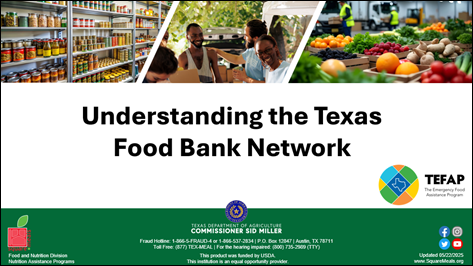 |
Understanding the Texas Food Bank Network
This training video provides an overview of how regional food banks strengthen their operations through partnerships with the Texas Department of Agriculture (TDA) and the Texas Food Bank Network. Viewers will gain a foundational understanding of TEFAP in Texas, including the roles of TDA, Contracting Entities, food banks, and local pantries. The video also covers food distribution processes, program compliance requirements, and real-world best practices shared by Commissioner Sid Miller and leaders from Texas food banks.
Intended Audience: staff and volunteers who work at emergency feeding organizations such as food banks, soup kitchens, and housing authorities.
Duration: Approximately 9 minutes |
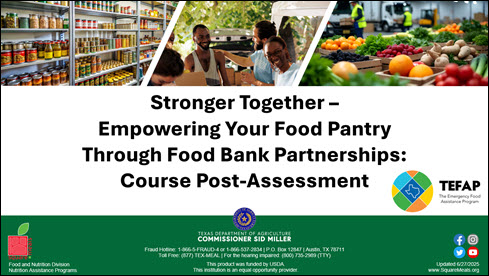 |
Course Post-Assessment: Stronger Together - Empowering Your Food Pantry Through Food Bank Partnerships
After completing the course modules, please take the TEFAP Training survey and post-assessment to receive your TDA Certificate of Completion.
Intended Audience: Staff and volunteers at emergency feeding organizations, including food banks, soup kitchens, and housing authorities.
Duration: Approximately 9 minutes |
 |
TEFAP Webinar on Strengthening Food Bank Partnerships
Overview of the course materials presented May 27, 2025, – not applicable for certification.
Intended Audience: Contracting Entities
Duration: Approximately 75 minutes |

Preparing Neighbors for TEFAP Help |
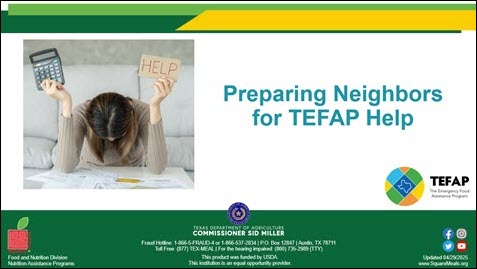 |
Preparing Neighbors for TEFAP Help
This web-based training course covers how to explain TEFAP, check eligibility, and guide neighbors through finding food and preparing for distributions.
Intended Audience: New staff and volunteers at food banks, food pantries, and emergency feeding organizations.
Duration: Approximately 30 minutes |
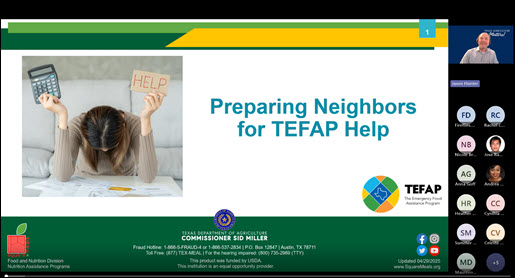 |
TEFAP Webinar on Preparing Neighbors for TEFAP Help
Overview of the course materials presented May 28, 2025, – not applicable for certification.
Intended Audience: Contracting Entities
Duration: Approximately 50 minutes |

How to Process TEFAP Benefit Applications |
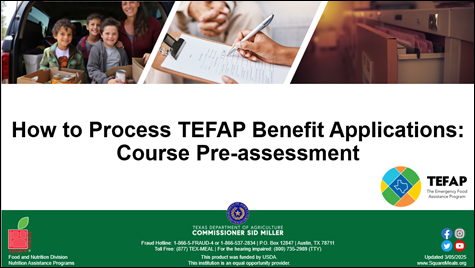 |
Course Pre-Assessment - How to Process TEFAP Benefit Applications
Before starting the training, please take a few minutes to complete this short assessment. Your responses will help measure the training’s effectiveness.
Intended Audience: Staff and volunteers at emergency feeding organizations, including food banks, soup kitchens, and housing authorities.
Duration: 7 minutes 30 second |
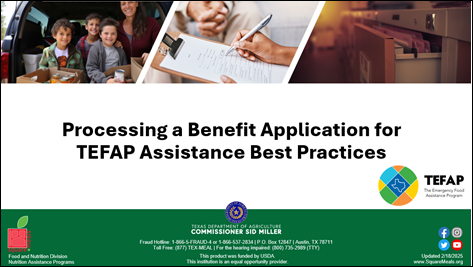 |
Processing a Benefit Application for TEFAP Assistance Best Practices
This training video offers best practices for assisting individuals and families with the TEFAP benefit application process. It provides a clear, step-by-step guide to confidently navigate the application procedure.
Intended Audience: new staff and volunteers who administer the program at contracting entities, food banks, and partner agencies.
Duration: Approximately 6 minutes |
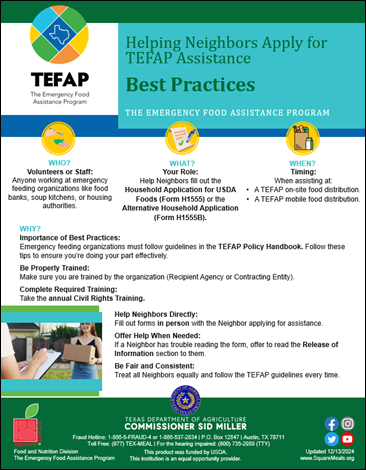 |
Helping Neighbors Apply for TEFAP Assistance – Best Practices
This job aid provides best practices for helping neighbors complete TEFAP household applications (Forms H1555/H1555B) during food distributions.
Intended Audience: staff and volunteers who work at emergency feeding organizations such as food banks, soup kitchens, and housing authorities.
Duration: Approximately 5 minutes |
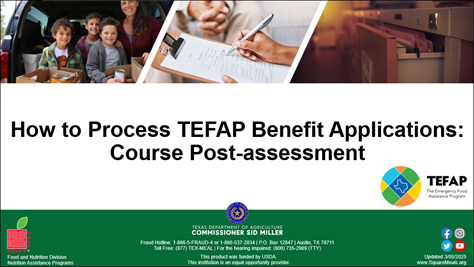 |
Course Post-Assessment - How to Process TEFAP Benefit Applications
After completing the course modules, please take the TEFAP Training survey and post-assessment to receive your TDA Certificate of Completion.
Intended Audience: Staff and volunteers at emergency feeding organizations, including food banks, soup kitchens, and housing authorities.
Duration: Approximately 9 minutes |
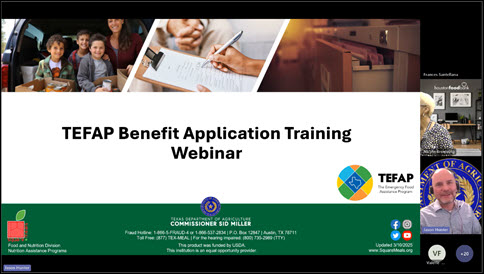 |
TEFAP Benefit Application Training Webinar
Overview of the course materials presented March 11, 2025, – not applicable for certification.
Intended Audience: Contracting Entities
Duration: 45 minutes |

How to Properly Transport, Handle, and Use USDA Foods |
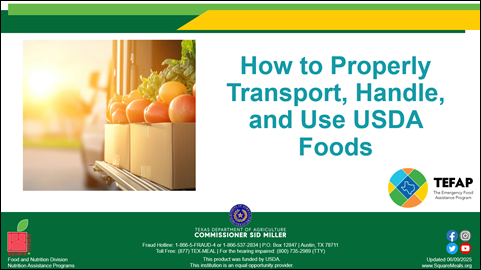 |
How to Properly Transport, Handle, and Use USDA Foods
This course provides essential training on safely handling and managing USDA Foods. Participants will learn proper transportation, storage, and distribution practices that align with USDA guidelines to ensure food safety, quality, and regulatory compliance. The training helps maximize the effective use of USDA Foods in serving communities in need.
Intended Audience: staff and volunteers who work at emergency feeding organizations such as food banks, soup kitchens, and housing authorities.
Duration: Approximately 45 minutes
|
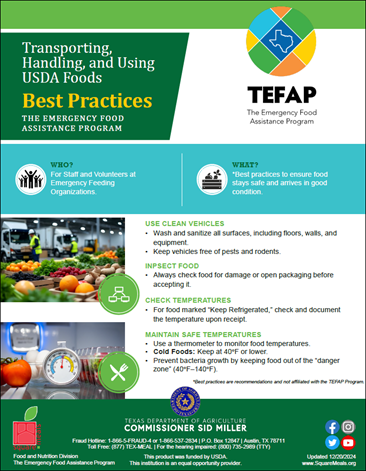 |
Transporting, Handling, and Using USDA Foods – Best Practices
This job aid provides best practices to maintain food safety, prevent spoilage, and protect against contamination during transportation and storage.
Intended Audience: staff and volunteers who work at emergency feeding organizations such as food banks, soup kitchens, and housing authorities.
Duration: Approximately 5 minutes
|
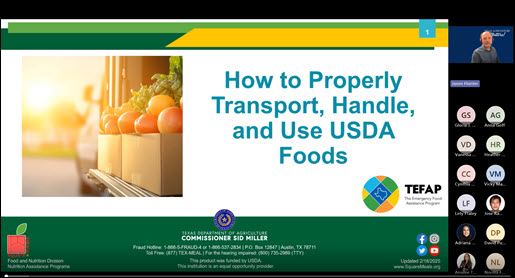 |
TEFAP Webinar: How to Properly Transport, Handle, and Use USDA Foods
Overview of the course materials presented June 5, 2025, – not applicable for certification.
Intended Audience: Contracting Entities
Duration: 45 minutes |

Handling Program Complaints and Conflict Resolution |
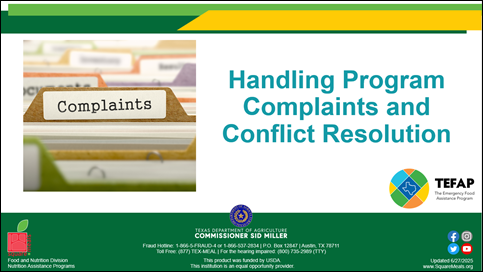 |
Handling Program Complaints and Conflict Resolution
This interactive module is designed to assist you in understanding how TDA handles program complaints, and how to identify, respond to, and document program and civil rights complaints in accordance with TDA guidelines. Learners will also develop skills in conflict resolution and professional communication to support program compliance and service excellence.
Intended Audience: staff and volunteers who work at emergency feeding organizations such as food banks, soup kitchens, and housing authorities.
Duration: Approximately 45 minutes |
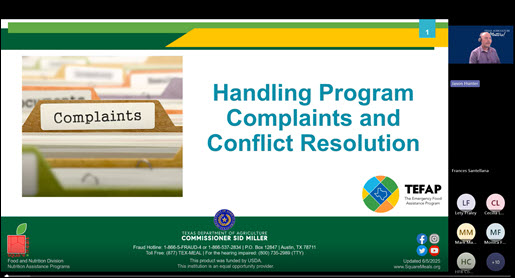 |
TEFAP Webinar
Overview of the course materials presented June 6, 2025, – not applicable for certification.
Intended Audience: Contracting Entities
Duration: Approximately 45 minutes |
TEFAP Onboarding - New CE Training
| Course Name |
Course Description |
Course Materials |
| TEFAP Policy Handbook Training Program Series |
| Using the TEFAP Policy Handbook Training Program Series |
This short, how-to video will assist in getting you started on your TEFAP Learning Journey!
This module provides instructions on how to fill out the forms, assessments, surveys, and certificates.
Intended Audience: New and advanced users who administer and operate the program at Contracting Entities (CEs), Food Banks, and Partner Agencies.
Duration: 5 minutes |
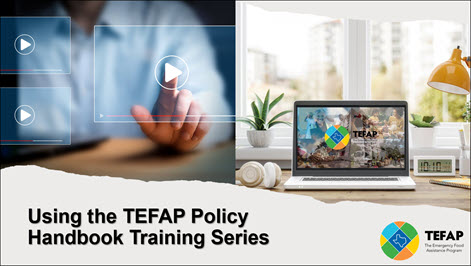 |
| Section 1: Introduction |
This module provides comprehensive training on the administrative functions and responsibilities inherent to the TEFAP program. Participants will gain a thorough understanding of key administrative tasks and roles involved in TEFAP operations.
Intended Audience: New users who administer and operate the program at Contracting Entities (CEs), Food Banks, and Partner Agencies
Hours of Instruction: 0.5
Professional Standards Code(s): 3000 |

Self-paced training with Certificate
|

|
| Section 2: Program Application |
This module, you will learn how to recognize the eligibility criteria for organizations seeking participation in the TEFAP program.
Intended Audience: New users who administer and operate the program at Contracting Entities (CEs), Food Banks, and Partner Agencies
Hours of Instruction: 0.75
Professional Standards Code(s): 3000 |

|

Webinar Recording June 2024
|
| Section 3: Household Application |
This module explains the criteria for enrolling participants in TEFAP using the Household Application for USDA Foods (Form H1555), emphasizing strategies to minimize incomplete applications and ensure accurate participant enrollment.
Intended Audience: New users who administer and operate the program at Contracting Entities (CEs), Food Banks, and Partner Agencies
Hours of Instruction: 0.75
Professional Standards Code(s): 3000
|

Self-paced training with Certificate
|

Webinar Recording June 2024
|
| Section 4: Implementing Culturally Diverse USDA Foods |
This module focuses on understanding and accommodating clients' dietary requirements aligned with their cultural and religious practices. Participants will learn how to select and procure USDA Foods suitable for these specific dietary needs and preferences.
Intended Audience: New and advanced users who administer and operate the program at Contracting Entities (CEs), Food Banks, and Partner Agencies
Hours of Instruction: 0.5
Professional Standards Code(s): 1000, 2000, 4100 |

Self-paced training with Certificate
|

Webinar Recording June 2024
|
| Section 5: Introduction to Administrative Reviews |
This module, participants will learn about the Administrative Review process, identify the entity responsible for conducting the review from a list of options, and discover where to access additional resources for deeper insights into the Administrative Review procedures.
Intended Audience: New users who administer and operate the program at Contracting Entities (CEs), Food Banks, and Partner Agencies
Hours of Instruction: 0.5
Professional Standards Code(s): 3000 |

Self-paced training with Certificate
|

Webinar Recording June 2024
|
| Section 6: Civil Rights - Limited English Proficiency |
This module addresses legal obligations regarding Limited English Proficiency (LEP) within the TEFAP program, offering strategies to mitigate language barriers and improve communication with non-English-speaking participants to ensure equitable access to benefits, programs, information, and services.
Intended Audience: New and advanced users who administer and operate the program at Contracting Entities (CEs), Food Banks, and Partner Agencies
Hours of Instruction: 0.5
Professional Standards Code(s): 4100 |

Self-paced training with Certificate
|

Webinar Recording June 2024
|
| Section 7: Allowable and Unallowable Costs |
This module explains the criteria used to determine whether costs are classified as "allowable" or "unallowable" when using federal TEFAP program funds.
Intended Audience: New users who administer the program at Contracting Entities (CEs), Food Banks, and Partner Agencies
Hours of Instruction: 0.5
Professional Standards Code(s): 3300 |

Self-paced training with Certificate
|

Webinar Recording June 2024
|
| Section 8: Denials and Terminations |
This module explores strategies for resolving disputes between Contract Entities and TDA, common reasons for TDA to deny a TEFAP application, and circumstances leading to the termination of a TEFAP Agreement.
Intended Audience: New users who administer the program at Contracting Entities (CEs)
Hours of Instruction: 0.5
Professional Standards Code(s): 3000 |

Self-paced training with Certificate
|

Webinar Recording June 2024
|
| Section 9: Terms, Definitions, and Acronyms |
This module is designed to provide comprehensive clarity on the terminology, definitions, and acronyms used throughout the TEFAP Program.
Intended Audience: New users who administer and operate the program at Contracting Entities (CEs), Food Banks, and Partner Agencies
Hours of Instruction: 0.5
Professional Standards Code(s): 2000, 3000 |

Self-paced training with Certificate
|

|
| Section 10: Disaster Policies and Procedures |
This module will enhance your understanding of distributing USDA foods through the TEFAP program during disaster situations, enabling you to effectively manage food distribution efforts during emergencies.
Intended Audience: New and advanced users who administer and operate the program at Contracting Entities (CEs), Food Banks, and Partner Agencies
Hours of Instruction: 0.5
Professional Standards Code(s): 2000, 3000, 4000 |

Self-paced training with Certificate
|

|
Attention
Training for the following programs is provided on an as-needed basis:
- Commodity Supplemental Food Program
- The Emergency Food Assistance Program (formerly known as the Texas Commodity Assistance Program or TEXCAP)
- Farmer's Market Nutrition Program
- Senior Farmer's Market Nutrition Program
Please contact USDA Foods at CommodityOperations@TexasAgriculture.gov or call (877) TEX-MEAL, Option 4 for assistance.
| Course Name |
Course Description |
|
| Web-Based Supply Chain Management Training: Goods Receipts of USDA Foods Shipments |
This 1 hour session covers the transition of food bank warehouse personnel submitting USDA Foods shipment receipts from TDA’s TX-UNPS to USDA’s Web Based Supply Chain Management System, or WBSCM. This will apply for all USDA “household” programs such as TEFAP, TEFAP off-shoot programs like BBB, CSFP, DA (Disaster Assistance), etc.
PowerPoint Presentation |
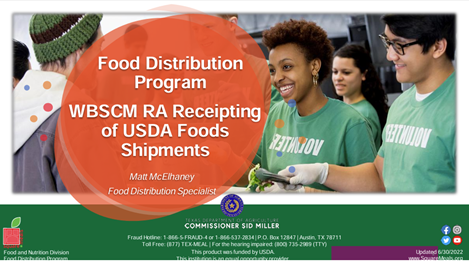 |
| TEFAP Household Application for USDA Foods |
This conference call was held on February 11, 2022 to provide an overview of the updates to the H1555 TEFAP Household Application for USDA Foods, and the new H1555b- TEFAP Household Application for USDA Foods- Alternate version. |
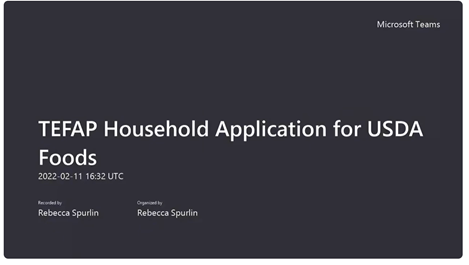 |
TEFAP/CSFP Administrative Review Webinar
TEFAP/CSFP
Administrative Review Presentation |
Training encompasses the Administrative Review processes. The Organizations due for an Administrative Review will go through the three main Review Phases.
- Phase 1: Desk Administrative Review and Uploading Documents. During this phase, participants will learn the key components of compiling necessary documents, ensuring compliance with program regulations, and uploading them to the designated platform
- Phase 2:Onsite Review and Exit Conference. In this phase, we'll delve into the onsite review process, covering what to expect during the onsite review visit and how the exit conference and findings will be communicated.
- Phase 3:The final phase focuses on corrective action steps following the review. Developing and implementing corrective action plans to address deficiencies and ensure ongoing compliance with program requirements
|
Additional Training Resources
| WBSCM Training for TEFAP |
This 45-minute workshop was recorded May 11, 2023, at MegaCon and covers a brief in-depth overview of the report functionality within the Web-based Supply Chain Management (WBSCSM) application. Participants will gain a greater understanding of the report functionality as we demonstrate how to customize reports, save reports, and view the net dollar value (savings) of a report.
Presenter: Tracy Whitehead (TDA) |
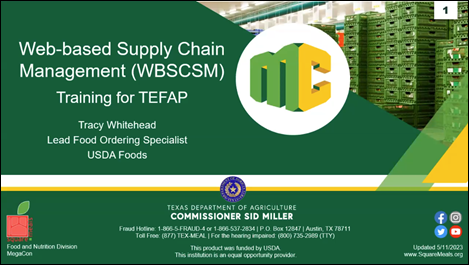 |
|